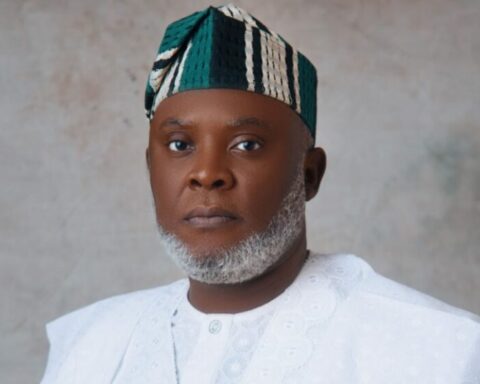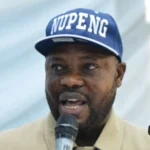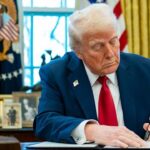In the theatre of nations, where the stage is etched with the invisible ink of treaties and the footlights flicker with the urgency of crises, a figure emerges whose presence is both a sonnet and a storm, a woman who weaves silk from the threads of history’s frayed edges. Bianca Odumegwu-Ojukwu stepped into the role of Minister of State for Foreign Affairs not as a novice, but as a phoenix clad in the garb of grace and grit. Appointed in November 2024, on a day when the harmattan winds whispered secrets of renewal across Nigeria, her journey unfolds like a river carving canyons through the arid plateaus of West Africa. Her shuttles stand as luminous arcs, illuminating the ECOWAS firmament and etching Nigeria’s image bolder on the world’s vast canvas.
Bianca emerged from the crucible of beauty queens and barristers, her crown from Miss Intercontinental in 1989 still gleaming like a talisman against failure. She, who once commanded catwalk runways, now influences council chambers from Accra to Luanda. From the swearing-in ceremony under President Bola Ahmed Tinubu’s watchful gaze to the symphonies of summits she has orchestrated, her impact resonates like a wooden flute blown at the dead of night, subtle, insistent, and transformative.
Her diplomacy is not just an itinerary of flights and handshakes; it is a choreography of impacts. Each spin lands a policy. In the ECOWAS region, Bianca’s shuttles have been the shuttlecocks in high-stakes games of regional resilience. Think of the Gambia and Senegal, where on June 10 and 11, she alighted as Tinubu’s Special Envoy, bearing invitations to the West Africa Economic Summit (WAES) like olive branches forged in the fires of ambition. On that day, the air in Banjul hummed with the scent of baobab blossoms and unspoken alliances. As she met Gambian leaders, her words became a velvet glove over an iron fist of economic imperative. She delivered with elegant candour.
In Dakar, amid the rhythmic pulse of Senegalese sabar drums, her diplomacy deepened the groove, securing nods for Abuja’s June 20-21 gathering. These were no perfunctory visits; they were sutures stitching the fraying fabric of ECOWAS, where intra-regional trade, languishing at a meagre 15% of total commerce, yearns for the oxygen of unity. The WAES itself, under her stewardship, bloomed into a verdant forum of exaltation where ministers and moguls converged to dissect the carcass of economic disparity. Bianca framed the discourse: “Fragmented markets beget feeble fortunes,” she declared in her opening address, her voice a cascade of conviction that rippled through the assembly hall.
The summit’s outcomes were not mere memos but milestones, projecting a 12% surge in cross-border investments by year’s end, as per ECOWAS Secretariat tallies. Her shuttles here were seismic, quelling the aftershocks of the Alliance of Sahel States’ (AES) secessionist tremors from Niger, Mali, and Burkina Faso. While the AES’s January 2024 withdrawal announcement had sent shockwaves, Bianca’s quiet calculus, blending carrots of cooperation with sticks of strategic isolation, nudged the bloc toward reintegration dialogues.
In private parleys with Malian envoys in July 2025, she evoked the ECOWAS Protocol on Free Movement, reminding that “borders are but lines on maps,” and that “our peoples’ pulses beat as one.” By October, preliminary talks in Niamey hinted at a thaw, with Nigeria resuming power exports to Niger, a gesture that lit bulbs in 2 million homes and loosened frozen assets worth $150 million. ECOWAS’s heart beats not only in summits but in the sinews of everyday exchange, and here Bianca’s touch turns base metal to gold.
The ECOWAS Trade Liberalisation Scheme (ETLS), that venerable 1979 edifice of duty-free dreams, found in her a fervent custodian. On October 28, Enugu’s International Conference Centre erupted in a mixture of commerce under the theme “Increasing Intra-Regional Trade through ETLS.” Bianca stood like a sentinel of the Southeast’s entrepreneurial chi, with an exhortation to about 3,000 delegates, she said that “SMEs are the sinew of our sovereignty… let ETLS be the wind beneath their wings.” With Nigeria boasting 3,146 registered ETLS firms, 36.1% of the regional total, and 2024 alone witnessing 800 new entries, her advocacy ignited registrations, funnelling about 500 novel products into the market. It was a new gateway to southeast traders, who now eye duty-free lanes to Côte d’Ivoire’s cocoa ports and Ghana’s goldfields. The Ministry has projected a 20% surge in intra-ECOWAS exports from Nigeria by 2026 on account of this.
But diplomacy’s dance demands more than economic elegance; it courts the spectres of strife. In July 2025, when Accra’s streets seethed with anti-Nigerian rhetoric with protests decrying crime waves and economic strains, Bianca’s shuttle to Ghana became a masterstroke of mediation. Landing at Kotoka International under twilight’s veil, she convened with Foreign Minister Samuel Ablakwa. Her discourse was a delicate mix of empathy and equity. “Brotherhood knows no blame,” she posited, invoking the ECOWAS Charter’s sanctity of solidarity. By the week’s end, a joint communiqué quelled the clamour leading to enhanced consular protections, diaspora dialogues, and a $50 million bilateral fund for youth skills in both nations. This was no pyrrhic peace; it fortified the free movement protocol, ensuring that the yam seller from Kano reaches Kumasi’s markets unscathed, and the engineer from Argungu plugs into Accra’s grids.
At the May 31, 2025, roundtable in Lagos marking ECOWAS’s golden jubilee, which was held at the NIIA, Bianca unfolded a new vision of ECOWAS. Her keynote, which was a tapestry of resilience, wove peacekeeping triumphs of ECOWAS with future-proofing pleas against climate disasters and jihadist shadows. “Unity is our unassailable arsenal,” she intoned, charging the assembly to temper compassion for AES defectors with compassionate resolve. A Lagos Declaration afterwards, pledging $1.2 billion to green infrastructure, with Nigeria’s 40% seed funding under her nudge, was achieved.
Venturing beyond the region’s rim, Bianca’s global gambits gleam like stars in a midnight sky. She has worked to position Nigeria as the giant not just of muscle but of mind. The Aqaba Process in Rome on October 15 was her apotheosis in anti-extremism advocacy. Co-chaired by Italy’s Giorgia Meloni and Jordan’s King Abdullah II, the summit drew presidents from across the Mediterranean and Sahel. And, Bianca lent her lyricism to the fray, blending data on transnational threats with calls for root-cause remedies. She left Rome, haven secured a $300 million EU pledge for Sahel stabilisation, with Nigeria earmarked for 25% in drone surveillance tech. This was diplomacy distilled: not broadsides, but blueprints.
Angola also felt her finesse in the September 5th Bilateral Economic Joint Commission in Luanda. Amid the Atlantic’s azure gaze, Bianca led a cluster signing of 15 Memoranda of Understanding like accords etched in emerald. “Mutual benefit is our meridian,” she proclaimed to Secretary Domingos Lopes, her words catalysing twinning pacts between Nasarawa/Bayelsa and Angola’s Bengo/Namibe provinces. The meeting yielded a $2 billion pipeline for Gulf of Guinea gas, which will channel Luanda’s bounty to Lagos’s refineries, and a cultural corridor between both countries. By October, illicit drug flows dipped 18%, per INTERPOL metrics, a testament to her shuttle’s seismic shift from rhetoric to reality.
Echoing Tinubu’s 4D doctrine: Democracy, Development, Diaspora, Demography, Bianca has diplomatically unlocked a $500 million in agrotech infusions for Nigeria’s breadbasket; a Pretoria Pact on migration and minerals, which unlocks 10,000 work visas and greening $800 million in rare-earth ventures between Nigeria and South Africa; $14 billion in Indian inflows, €250 million Dutch deals, and Eurobond’s 300% surfeit. She has commercialised the Technical Aid Corps, dispatching 213 volunteers to ACP realms, and co-chaired the Green Guarantee Group with Germany, greening $5 billion in transitions.
It is just 365 days of impact diplomacy. But Bianca stands astride the equator of influence. From ECOWAS’s embattled embrace to the world’s wary watch, she has humanised hegemony with radiant smiles, while transmuting peril into possibility. In her, Nigeria beholds not just a minister, but a woman whose orbit, radiant and relentless, promises that the giant awakens, not with roars, but with the whisper of soothing breeze over the Sahara. One year in, and the world tilts toward her light. What symphonies shall the next compose? The stage waits. Breathless!


























